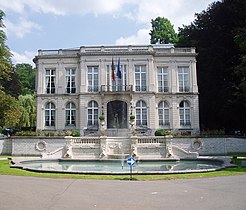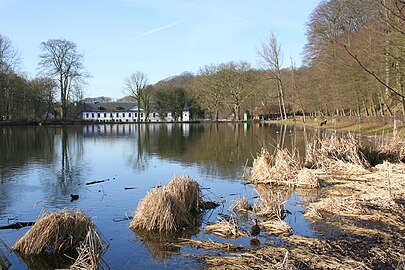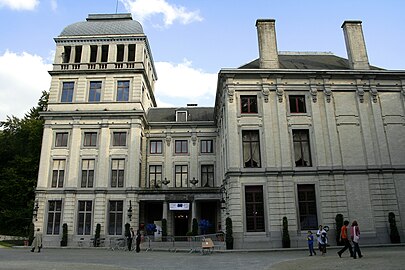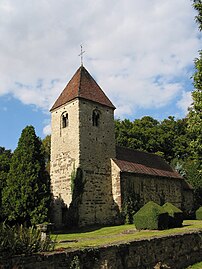Auderghem
Auderghem
| |
|---|---|
 Château Sainte-Anne | |
| Coordinates: 50°49′00″N 04°25′34″E / 50.81667°N 4.42611°E | |
| Country | |
| Community | Flemish Community French Community |
| Region | Brussels-Capital |
| Arrondissement | Brussels-Capital |
| Government | |
| • Mayor | Sophie de Vos |
| • Governing party/ies | LB (DéFI), Ecolo-Groen |
| Area | |
| • Total | 8.97 km2 (3.46 sq mi) |
| Population (2020-01-01)[1] | |
| • Total | 34,404 |
| • Density | 3,800/km2 (9,900/sq mi) |
| Postal codes | 1160 |
| NIS code | 21002 |
| Area codes | 02 |
| Website | www.auderghem.be (in French) www.oudergem.be (in Dutch) |
Auderghem (French, pronounced [odœʁɡɛm]; former Dutch spelling) or Oudergem (Dutch, pronounced [ˈʌudərɣɛm] ) is one of the 19 municipalities of the Brussels-Capital Region, Belgium. Located in the south-eastern part of the region, along the Woluwe valley and at the entrance to the Sonian Forest, it is bordered by Etterbeek, Ixelles, Watermael-Boitsfort, and Woluwe-Saint-Pierre, as well as the Flemish municipalities of Tervuren and Overijse. In common with all of Brussels' municipalities, it is legally bilingual (French–Dutch).
Despite large roads slicing through and the increasing traffic, the municipality has an environmental advantage, and it has been able to preserve a relatively important part of its natural and historic legacy: the creeks, Rouge Cloître Abbey and its art centre, the Priory of Val-Duchesse, the Château of Three Fountains, the Château Saint-Anne, and St. Anne's Chapel.
History
[edit]Three forest villages (Auderghem, Watermael, and Boitsfort-Bosvoorde), were one for centuries. In 1794, the soldiers of the French Revolution decided to separate these into three distinct municipalities. In 1811, Napoleon decided to reunite the three villages, by imperial decree, into a single administrative entity. But Auderghem was withdrawn from this union by royal act, leaving Watermael-Boitsfort on its own. Thus, Auderghem became an independent municipality in 1863, with only 1,600 inhabitants.
With the construction of the rail line linking Brussels and Tervuren as well as, in 1910, the construction of the Boulevard du Souverain/Vorstlaan, modernisation came to the municipality and the population grew quickly. In 1956, Paul Henri Spaak lead the Intergovernmental Conference on the Common Market and Euratom at the Château of Val-Duchesse in Auderghem, which prepared the Treaties of Rome in 1957 and the foundation of the European Economic Community and Euratom in 1958.
Demographics
[edit]As of 2004[update], the majority of Brussels' Japanese expatriate population lives in Auderghem.[2]
Main sights
[edit]- The Priory of Val-Duchesse, a gift of the Belgian King, is rarely open to the public. In 1963, Belgium's cabinet ministers met there, planting the seeds of a federalisation of the country though at conditions fiercely criticised especially in some extremist Flemish nationalist circles.
- Similarly, St. Anne's Chapel, whose origins go back to the 12th century, is not open to the public. Decommissioned in 1843, it was sold several times. Its splendid sculptures from the Middle Ages and notable period furniture are still there to admire.
- The municipality also offers many green spaces.
-
St. Anne's Chapel
Notable inhabitants
[edit]- Léon Huygens (1876–1918), painter
- Odette De Wynter (1927–1998), first woman notary in Belgium
Education
[edit]Source:[3]
Public secondary schools from the French Community of Belgium
[edit]Subsidised religious secondary schools
[edit]- Centre scolaire St-Adrien Val Duchesse
- Institut St-Julien Parnasse
- Ecole Sainte-Bernadette
- Institut Dominique Pire
Subsidised non-religious secondary schools
[edit]- De l'autre côté de l'école
Private international schools
[edit]References
[edit]Citations
[edit]- ^ "Bevolking per gemeente op 1 januari 2020". Statbel.
- ^ State 2004.
- ^ "Ecoles secondaires." Auderghem. Retrieved on September 12, 2016.
- ^ "ブラッセル日本人学校 TOP:" The Japanese School of Brussels. Retrieved on 2 January 2014. "Avenue des Meuniers 133, 1160 Auderghem, Brussels, Belgium"
Bibliography
[edit]- State, Paul F. (2004). Historical dictionary of Brussels. Historical dictionaries of cities of the world. Vol. 14. Lanham, MD: Scarecrow Press. ISBN 978-0-8108-5075-0.
External links
[edit] Media related to Auderghem at Wikimedia Commons
Media related to Auderghem at Wikimedia Commons- Official site of the Municipality of Auderghem (in French)
- Official site of the Municipality of Oudergem (in Dutch)









